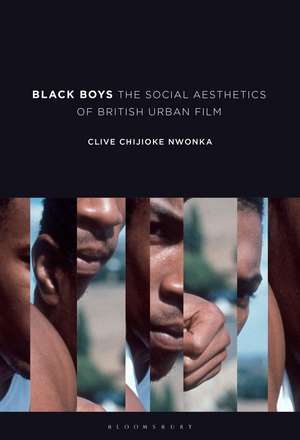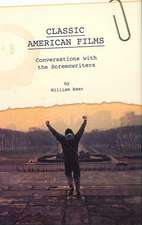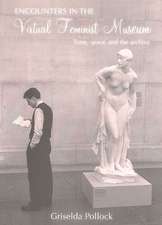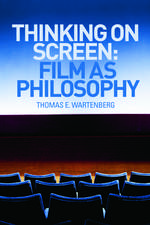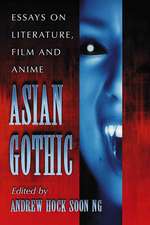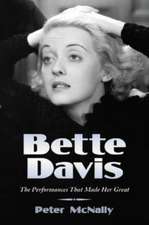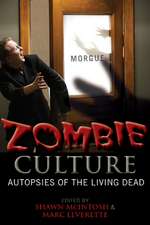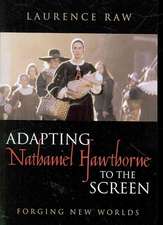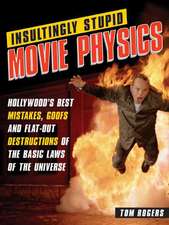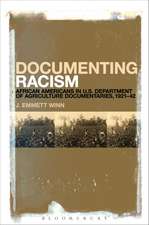Black Boys: The Social Aesthetics of British Urban Film
Autor Clive Chijioke Nwonkaen Limba Engleză Paperback – 20 sep 2023
| Toate formatele și edițiile | Preț | Express |
|---|---|---|
| Paperback (1) | 169.03 lei 3-5 săpt. | +47.26 lei 6-10 zile |
| Bloomsbury Publishing – 20 sep 2023 | 169.03 lei 3-5 săpt. | +47.26 lei 6-10 zile |
| Hardback (1) | 541.54 lei 6-8 săpt. | |
| Bloomsbury Publishing – 20 sep 2023 | 541.54 lei 6-8 săpt. |
Preț: 169.03 lei
Preț vechi: 194.37 lei
-13% Nou
Puncte Express: 254
Preț estimativ în valută:
32.35€ • 33.13$ • 26.91£
32.35€ • 33.13$ • 26.91£
Carte disponibilă
Livrare economică 26 februarie-12 martie
Livrare express 11-15 februarie pentru 57.25 lei
Preluare comenzi: 021 569.72.76
Specificații
ISBN-13: 9798765105849
Pagini: 336
Ilustrații: 39 bw illus
Dimensiuni: 152 x 229 x 24 mm
Greutate: 0.5 kg
Editura: Bloomsbury Publishing
Colecția Bloomsbury Academic
Locul publicării:New York, United States
Pagini: 336
Ilustrații: 39 bw illus
Dimensiuni: 152 x 229 x 24 mm
Greutate: 0.5 kg
Editura: Bloomsbury Publishing
Colecția Bloomsbury Academic
Locul publicării:New York, United States
Caracteristici
Engages with a number of films within the British urban film canon that are yet to have received focused attention and analysis within film studies
Notă biografică
Clive Chijioke Nwonka is Associate Professor in Film, Culture and Society at University College London, UK.
Cuprins
AcknowledgementsDedicationIntroduction1. The Symbolic Location and the Extractive Choreographies of the Black Mytheme2. Hegemonic (A)Symmetries of Black British Filmic Identity in the 90s3. Black Cultural Politics and the Management of Racial Difference4. The Hauntological Black Urban Other5. A Storm in Angell Town: Black Youth Delinquency in Storm Damage 6. Constructing Black Urbanity: Mediatations of Black-on-Black criminality7. 'Fuck Society': Tower Block Dreams, Adjacent PSB and Urban subcultural Excessivity8. Kes With Guns: Bullet Boy and the Urban Text's Ontological Suture 9. Hugging a Hoodie: Broken Britain, Conviviality and the Agnotology of the Urban Text10. Defensible Black Spaces: Race, British Identity and Architecture in Attack the Block 11. Of Simulacra, Performativity and Language: Top Boy, Black Cultural Visibility and the Popular12. Conclusion: The (Un)Exceptional Textures of Black Urbanity Bibliography
Recenzii
Adopting a unique, contextual approach to film, drawing linkages between the political economy, the social and the aesthetic, Clive Nwonka provides a rich and unashamedly complex analysis of Black urban film, a genre that is at best, not taken seriously, and at worst, denigrated and dismissed. Nwonka has produced the most important book on Black British visual culture since Kobena Mercer's Welcome to the Jungle (1994).
Black Boys is a brilliant ensemble of screen cultures and the scripting of Black youth, masculinity and class. Clive Nwonka hones an intellectual and inhabited understanding of the vitality and racial abrasions that shape Black urban identity in Britain. Attuned, detailed and acute, this remarkable book reveals the reverberations across the cinematic and street life of 'race', politics and place.
A brilliantly textured account that weaves the politics of race into the story of black cultural production. Its rejection of the singular flatness of black urban lives captured in film encapsulates a deft critique of the harmful ideological, material, cultural and aesthetic features of film production. Thoughtfully and convincingly argued, violence by the state and creative industries is centre-framed in Nwonka's Black Boys.
Black Boys should be essential reading for anyone with a serious interest in British film and media, and Black British culture more broadly. Stretching across and collapsing the boundaries between disciplines, this is a book of great substance, sophistication and insight, which offers a way of seeing Black masculinity and urban identity which is both meticulous in its analysis and revelatory in its conclusions.
Black Boys is a precious and unique assessment of the vital, everchanging living archive of Black British film and TV. Through Nwonka's detailed historical alignments and incisive theoretical poetry we come to view these texts less as a window onto the realities of UK Black urbanism but rather as a way of questioning their version of that reality. What is included in these film spectacles of violence and bodily and social injury and also what remains absent and out of frame? Black Boys helps us find an answer to these questions and gauge how close these texts are to an adequate portrayal of Black lives on screen.
Black Boys is a brilliant ensemble of screen cultures and the scripting of Black youth, masculinity and class. Clive Nwonka hones an intellectual and inhabited understanding of the vitality and racial abrasions that shape Black urban identity in Britain. Attuned, detailed and acute, this remarkable book reveals the reverberations across the cinematic and street life of 'race', politics and place.
A brilliantly textured account that weaves the politics of race into the story of black cultural production. Its rejection of the singular flatness of black urban lives captured in film encapsulates a deft critique of the harmful ideological, material, cultural and aesthetic features of film production. Thoughtfully and convincingly argued, violence by the state and creative industries is centre-framed in Nwonka's Black Boys.
Black Boys should be essential reading for anyone with a serious interest in British film and media, and Black British culture more broadly. Stretching across and collapsing the boundaries between disciplines, this is a book of great substance, sophistication and insight, which offers a way of seeing Black masculinity and urban identity which is both meticulous in its analysis and revelatory in its conclusions.
Black Boys is a precious and unique assessment of the vital, everchanging living archive of Black British film and TV. Through Nwonka's detailed historical alignments and incisive theoretical poetry we come to view these texts less as a window onto the realities of UK Black urbanism but rather as a way of questioning their version of that reality. What is included in these film spectacles of violence and bodily and social injury and also what remains absent and out of frame? Black Boys helps us find an answer to these questions and gauge how close these texts are to an adequate portrayal of Black lives on screen.
